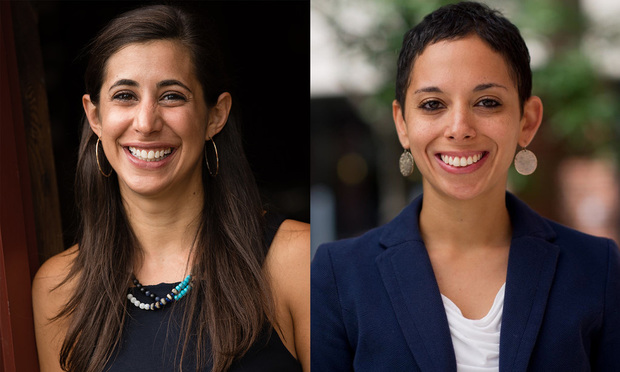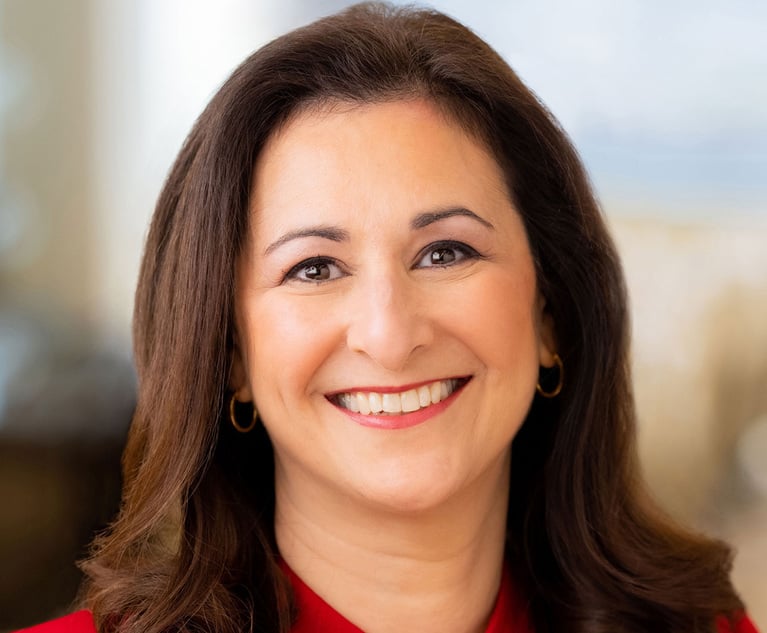Where Children Don't Belong: Adult Jail
In the course of more than four years of working directly with youth facing charges in the adult justice system, we have visited teenagers in Philadelphia's adult jails dozens of times. No matter how many visits we make, the inhumanity of the practice of holding youth as adults is striking, and painful to experience. It is wrong, and it should end.
November 23, 2018 at 12:32 PM
7 minute read
 Left to right: Lauren Fine and Joanna Visser Adjoian, co-founders and co-directors of the Youth Sentencing & Reentry Project (YSRP).
Left to right: Lauren Fine and Joanna Visser Adjoian, co-founders and co-directors of the Youth Sentencing & Reentry Project (YSRP).
Children do not belong in adult jails. Period.
Through our work with youth facing charges in the adult justice system, we have visited teenagers in Philadelphia's adult jails dozens of times. No matter how many visits we make, the inhumanity of the practice of holding youth as adults is striking, and painful to experience. It is wrong, and it should end.
“I am so ready to get out of this place, no human being should be here,” said Abdullah, who beginning at 15 years old, spent more than a year in one of Philadelphia's adult jails awaiting his day in court. He was at the adult jail pending a “decertification” hearing, at which a judge decides whether a youth's case that has been “direct-filed” in adult court should remain there, or be removed from the adult system and refiled in the juvenile justice system. Each year, well over one hundred Philadelphia youth have their cases directly filed in adult court. As a result, they spend time—sometimes up to years—at one of Philadelphia's adult jails. All before they are even old enough to vote, or legally purchase cigarettes.
The organization we co-lead, the Youth Sentencing & Reentry Project (YSRP), has been working to end this practice in collaboration with several partners: the Defender Association of Philadelphia, the Youth Art & Self-Empowerment Project (YASP), and Juvenile Law Center. We have met regularly for the last year and a half to discuss our experiences and perspectives, and develop resources to share with city officials who can affect change. Together we wrote an Op-Ed on the subject, which ran in the Inquirer this past June, where we voiced concern over the city's plan to relocate male youth facing adult charges from the Philadelphia Industrial Correctional Center (PICC) to the Riverside Correctional Facility (RCF), the city's jail for adult women, without input from relevant stakeholders. We predicted that this move would not improve the well-being of children in detention, or public safety. Unfortunately, our prediction was correct.
Male youth charged as adults now have been held at the adult jail for women for the last five-plus months. Federal law—the Prison Rape Elimination Act—requires that they be “sight and sound” separated from adults, so they are not intermingled with the adult women the jail was designed to serve. The conditions of the educational environment for youth in adult jail in Philadelphia have never been good, and they have only worsened as a result of the recent move. There are no classrooms, and youth receive instruction on a residential “cell block,” designed to house adult women. Like the unit where they are housed, this block does not have access to outside air or light. Instruction time is often interrupted by announcements over the prison's PA system.
Not only do youth held in adult jails receive sub-par education, they are often held in isolation (on either “administrative” or “disciplinary” segregation) for extended periods of time, ranging from a few days to several months. The Philadelphia Inquirer has reported on this issue extensively. According to information the Inquirer obtained through Right to Know requests of the Philadelphia Department of Prisons, youth at PICC were placed in segregation 41 times in 2015, for an average of 32 days each time. Despite the city's public commitment to reduce the use of solitary confinement on children, the Inquirer later found that between January 2017 and March 2018, segregation was imposed on youth 70 times, also for an average of 32 days each time,. Along with this coverage, the Inquirer published testimony from one 17-year-old who was put in solitary confinement six times, spending at least 30 days in isolation on five of those occasions.
Opportunities for rehabilitation also are limited for youth held in adult facilities. Young people held at RCF do not have access to any outdoor space for their recreation time. The “yard” that is attached to their unit is fully enclosed by walls and a ceiling; it does not feel like being outside, and does not allow young people to see the sky or stand in the sun. When youth are placed in solitary, youth are in their cells for 22 hours a day with one hour allowed out during both the morning and afternoon shifts. During that hour they are allowed to shower and watch television. They are shackled during those hours except for during the few minutes they have to shower. They do not have access to phone calls or visitation from their families while in solitary. They may visit with attorneys, but they are shackled around their waist and feet. During one visit with a 15 year old, for example, he cried as he told us about the conditions he was experiencing. His tears caused his glasses to slide off of his face, and because he was shackled, he was unable to bend over to retrieve them from the floor. Sitting on the other side of the partition in the visiting room, we had to call for a guard to place the glasses back on our young client's face.
One of the most disturbing aspects of the conditions for youth at the adult jails is the treatment of young people who experience a mental health crisis. If staff believe that a young person may be at risk of harming themselves, that young person is transferred to the mental health unit at the Detention Center (DC), another adult jail on State Road. At DC, young people are held in total isolation wearing nothing but a “suicide smock” (akin to a wrestling mat) that only half-covers their bodies, often in freezing cold conditions. They are only allowed visits with their attorneys if the staff psychologist has deemed them “safe” for visitation and not a danger to themselves or others. These visits then take place with the youth handcuffed during the entire visit. Youth's meals are delivered to them and they have no access to educational instruction, writing materials or books while they are in crisis. Youth experiencing mental health challenges have described this facility as making them feel like they are in a prison within a prison.
These conditions cannot stand. Even when accused of serious charges, children belong in settings that are safe and age-appropriate. Other jurisdictions, including Chicago and New Orleans, have developed alternatives to holding youth in adult jails pre-trial, and Philadelphia should learn from their example. We encourage city policymakers, elected officials, and fellow advocates to join us in shining a light on this abhorrent practice, and working collectively to end it.
For more information about the support YSRP provides to youth facing charges in adult court, please visit www.ysrp.org.
Lauren Fine and Joanna Visser Adjoian are the co-founders and co-directors of the Youth Sentencing & Reentry Project (YSRP). YSRP uses direct service and policy advocacy to transform the experiences of children prosecuted in the adult criminal justice system, and to ensure fair and thoughtful resentencing and reentry for individuals who were sentenced to life without parole as children.
This content has been archived. It is available through our partners, LexisNexis® and Bloomberg Law.
To view this content, please continue to their sites.
Not a Lexis Subscriber?
Subscribe Now
Not a Bloomberg Law Subscriber?
Subscribe Now
NOT FOR REPRINT
© 2025 ALM Global, LLC, All Rights Reserved. Request academic re-use from www.copyright.com. All other uses, submit a request to [email protected]. For more information visit Asset & Logo Licensing.
You Might Like
View All


AI and Social Media Fakes: Are You Protecting Your Brand?

Neighboring States Have Either Passed or Proposed Climate Superfund Laws—Is Pennsylvania Next?
7 minute readTrending Stories
- 1Recent Controversial Decision and Insurance Law May Mitigate Exposure for Companies Subject to False Claims Act Lawsuits
- 2Visa Revocation and Removal: Can the New Administration Remove Foreign Nationals for Past Advocacy?
- 3Your Communications Are Not Secure! What Legal Professionals Need to Know
- 4Legal Leaders Need To Create A High-Trust Culture
- 5There's a New Chief Judge in Town: Meet the Top Miami Jurist
Who Got The Work
J. Brugh Lower of Gibbons has entered an appearance for industrial equipment supplier Devco Corporation in a pending trademark infringement lawsuit. The suit, accusing the defendant of selling knock-off Graco products, was filed Dec. 18 in New Jersey District Court by Rivkin Radler on behalf of Graco Inc. and Graco Minnesota. The case, assigned to U.S. District Judge Zahid N. Quraishi, is 3:24-cv-11294, Graco Inc. et al v. Devco Corporation.
Who Got The Work
Rebecca Maller-Stein and Kent A. Yalowitz of Arnold & Porter Kaye Scholer have entered their appearances for Hanaco Venture Capital and its executives, Lior Prosor and David Frankel, in a pending securities lawsuit. The action, filed on Dec. 24 in New York Southern District Court by Zell, Aron & Co. on behalf of Goldeneye Advisors, accuses the defendants of negligently and fraudulently managing the plaintiff's $1 million investment. The case, assigned to U.S. District Judge Vernon S. Broderick, is 1:24-cv-09918, Goldeneye Advisors, LLC v. Hanaco Venture Capital, Ltd. et al.
Who Got The Work
Attorneys from A&O Shearman has stepped in as defense counsel for Toronto-Dominion Bank and other defendants in a pending securities class action. The suit, filed Dec. 11 in New York Southern District Court by Bleichmar Fonti & Auld, accuses the defendants of concealing the bank's 'pervasive' deficiencies in regards to its compliance with the Bank Secrecy Act and the quality of its anti-money laundering controls. The case, assigned to U.S. District Judge Arun Subramanian, is 1:24-cv-09445, Gonzalez v. The Toronto-Dominion Bank et al.
Who Got The Work
Crown Castle International, a Pennsylvania company providing shared communications infrastructure, has turned to Luke D. Wolf of Gordon Rees Scully Mansukhani to fend off a pending breach-of-contract lawsuit. The court action, filed Nov. 25 in Michigan Eastern District Court by Hooper Hathaway PC on behalf of The Town Residences LLC, accuses Crown Castle of failing to transfer approximately $30,000 in utility payments from T-Mobile in breach of a roof-top lease and assignment agreement. The case, assigned to U.S. District Judge Susan K. Declercq, is 2:24-cv-13131, The Town Residences LLC v. T-Mobile US, Inc. et al.
Who Got The Work
Wilfred P. Coronato and Daniel M. Schwartz of McCarter & English have stepped in as defense counsel to Electrolux Home Products Inc. in a pending product liability lawsuit. The court action, filed Nov. 26 in New York Eastern District Court by Poulos Lopiccolo PC and Nagel Rice LLP on behalf of David Stern, alleges that the defendant's refrigerators’ drawers and shelving repeatedly break and fall apart within months after purchase. The case, assigned to U.S. District Judge Joan M. Azrack, is 2:24-cv-08204, Stern v. Electrolux Home Products, Inc.
Featured Firms
Law Offices of Gary Martin Hays & Associates, P.C.
(470) 294-1674
Law Offices of Mark E. Salomone
(857) 444-6468
Smith & Hassler
(713) 739-1250





